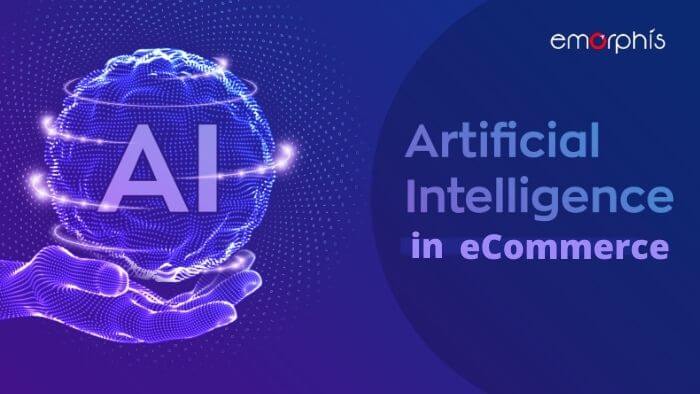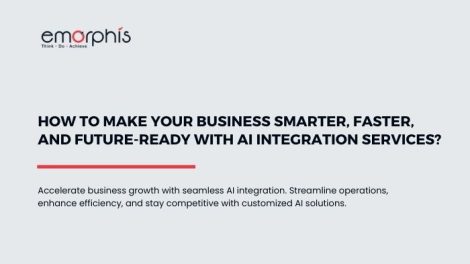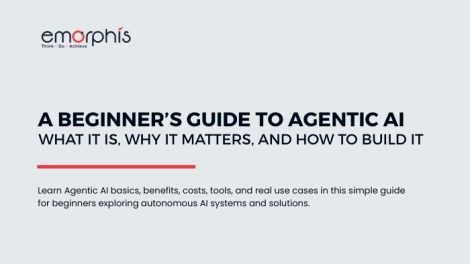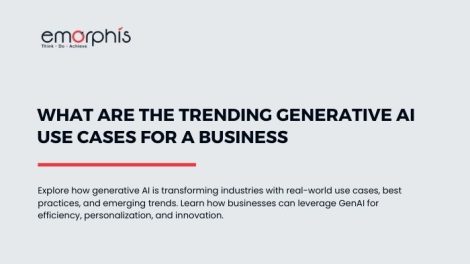Artificial intelligence (AI) technology is having a huge impact on the eCommerce industry. This article will explore some of the major trends in AI in eCommerce, eCommerce software development services, and how businesses are using artificial intelligence to benefit their customers.
How exactly is artificial intelligence changing eCommerce?
As eCommerce continues to grow across the world, consumers are adopting eCommerce more than ever before. Businesses are now providing customers with tailored experiences based on their potential spending, previous purchases, and other factors. AI technology has played a huge role in eCommerce development, allowing eCommerce websites to become more personalized for consumers.
Personalized Product Recommendations
One of the most useful contributions that AI has made to eCommerce is personalized product recommendations. These product recommendations allow eCommerce websites to display products that are relevant to individual users - whether it's based on what they have previously purchased or their buying habits. This enables eCommerce websites to provide customers with much.
eCommerce websites that provide customized product recommendations are able to boost conversion rates, making them much more likely to make a purchase.
A great example of personalized product recommendations in eCommerce is the Amazon website. The site has built an eCommerce empire because of its ability to deliver tailored products to customers - simply by using AI technology! When you visit the eCommerce website, it's able to track your activity and make suggestions for other items that might be useful for you. It knows what other people bought when they bought this item, so it'll also recommend similar products. And if you frequently look at products but don't buy them? You'll start noticing that will suggest that you add these items.
Personalized Shopping Experience
Artificial intelligence can also be used to provide improved shopping experiences for consumers, based on their particular needs and preferences. This is because eCommerce websites can analyze. It's not just consumer behavior that can be tracked - eCommerce websites are using artificial intelligence algorithms to understand what customers want in real-time. Because these sites have so much information about the products they sell, it's easy for them to recommend something that would interest you. So, if you've browsed items but haven't made a purchase, eCommerce websites are able to know the next time you visit.
This is very similar to personalized product recommendations - however, it's more generally about providing customers with the best possible shopping experience on an eCommerce website. This means that any information captured while browsing can be used by eCommerce websites to provide customers with tailored experiences when they return to the site.
Marketing intelligence
Marketing intelligence is also key to effective eCommerce. Brands are able to collect information about their customers, and then use this data to provide them with personalized experiences. This can be done by knowing what people buy, where they come from, how much time they spend on the site etc. All of these things provide brands with more information about who their customers are - which will enable them to tailor their customer experience even further for different groups.
When a customer makes their first purchase from an eCommerce site, there is a certain level of trust that forms between the company and the consumer. Marketing intelligence information helps build on this initial trust - it shows customers that an eCommerce business is dedicated to providing a tailored shopping experience for them, and one based around their individual needs. Marketing intelligence gives brands the ability to learn about what consumers want even before they know themselves!
As you can see marketing intelligence benefits both brands and consumers - which is why so many companies are now focusing on using AI technology as part of their marketing efforts. Marketing Intelligence e-services have become increasingly popular in recent years, with companies like Google investing time and money into refining these systems.
AI-enabled dynamic pricing
Price is an essential element of any product or service - it has the ability to make or break a sale. Pricing is also constantly changing due to fluctuating supply and demand - which means that businesses need an effective solution that allows them to respond quickly when such changes occur.
The pricing optimization is powered by AI technology. Pricing, like all other aspects of business, is about data - it needs to be done efficiently and effectively for maximum revenue. So, pricing strategies can make or break your eCommerce business - but with the help of intelligent pricing tools, you can improve your chances of success. Pricing optimization allows you to maximize profits while making sure that products are selling. And through "what-if" scenarios, businesses will be able to run various tests based on different price changes in order to find out what works best for them. Though this may seem like common sense, these types of decisions need to take place very quickly - which is where AI-enabled dynamic pricing comes into play!
Now that we understand how AI-enabled dynamic pricing works, let's take a closer look at how this AI technology will change the way we do business. Pricing optimization and AI-enabled dynamic pricing go hand in hand, and both of these technologies can be used to help optimize your eCommerce site and increase sales. Pricing optimization ensures that your prices are always within market norms so you can attract more customers and maximize revenue while avoiding negative margins due to overpricing.
Top-class customer service
Chatbots and virtual assistants help brands understand their customers better, which results in enhanced customer service and increased revenue.
The Chatbots and virtual assistants help brands understand their customers better, which results in enhanced customer service and increased revenue. Chatbots have been used for several years by top companies to provide a range of services - from simple customer support tasks to generating sales leads. The chatbots mimic human conversation patterns so they can answer customers' questions quickly and efficiently - something that previous automatons weren't able to do. Chatbots are also getting smarter, so they can predict customers' questions before they are asked. Chatbots have been around for a while - but virtual assistants are the next generation of this technology.
Virtual assistants are similar to Chatbots in that they can use AI technology to understand customer needs and respond with the most relevant content or offer. Virtual assistants can be used on websites, mobile applications, social media platforms, and internal networks to help improve customer service.
Customer segmentation
Customer segmentation helps retailers build personalized, targeted relationships with their customers by leveraging AI technology to understand the needs and preferences of each customer. When customer segmentation is performed using AI technology this helps to gain insights about customers' purchase history, demographics, location, engagement, and behavior patterns. Hence, customer segmentation allows you to understand your customers better - which is a must as consumers become more demanding and expect more customized experiences. Customer segmentation and AI-enabled dynamic pricing go hand in hand and can help you implement a more effective Customer Relationship Management (CRM) strategy. Customer segmentation provides a 360-degree view of your customers, which allows you to identify unique customer patterns and make informed decisions about future business strategies.
AI agents have become a vital element in the customer journey
From giving customers instant responses to automatically fulfilling orders. This is why AI-enabled dynamic pricing and Chatbots are becoming increasingly popular, as they provide a more personalized shopping experience for customers while optimizing performance and increasing conversions. The future of retail points towards AI-powered intelligent assistance that helps retailers increase sales while building stronger relationships with their customers. As technology continues to evolve, we'll see an increased number of brands build customer experiences based on AI-enabled dynamic pricing and virtual assistants.
Inventory, logistics, sales, and demand forecasting
Forecasting with AI becomes easy as it helps in getting forecast transit times, demand levels, and shipment delays. you can plan your inventory on both real-time and historical data. help in getting predictions on demand of products and also sales.
Forecasting helps to minimize carrying costs or damages by keeping the right level of inventory for sale purposes. It is a set of processes that makes use of current data such as forecasting techniques like exponential smoothing, causal models, etc., to predict the future demands so that proper steps may be taken at the time to avoid any shortage or unavailability of products in demand.
Forecasts related to transport facilities, inventory planning, and scheduling operations management all require different types and levels of accuracy. Transportation forecasting involves shipment planning and delivery schedules based on actual orders or capacity requirements. AI can easily work with Big data even when the information required has a huge volume and varied nature. For example, if you have a big volume of historical data related to demand levels along with other factors like weather conditions etc.,
AI helps in making inventory management more efficient by using real-time transactional data extracted from point-of-sale devices or other business systems such as warehouse control systems. For example, if you sell your products on an eCommerce platform, then depending upon the quantity/volume sold, it will automatically reduce the inventory levels and alert you about the same so that proper steps may be taken to order the right product quantities.
More details
An October 2020 survey revealed that 70 percent of e-commerce decision-makers in North America and Europe believed AI would help their business with personalization in 2021. Forecasting is one of the three key areas where AI is believed to help in eCommerce decision-making. These forecasts are analyzed on the basis of sales forecasting which is necessary for day-to-day business activities. Sales forecasts are used for sales planning, production budgeting, distribution planning, etc., while inventory forecasting helps in determining the right amount of inventory that needs to be held. Transportation forecasting involves shipment planning and delivery schedules based on actual orders or capacity requirements.
Our Expertise
The rise of artificial intelligence is changing the face of eCommerce as we know it. According to a survey, artificial intelligence has become more of a revenue driver. From personalized product recommendations to AI-enabled dynamic pricing, this new technology is enabling retailers with a competitive edge in an increasingly crowded marketplace. But how can you incorporate AI into your business? If you’re not sure where to start or what kind of solution will work best for your needs, we offer expert advice and software consultation that takes all these factors into account. Our team is an expert in software product development, applying machine learning and deep learning algorithms like neural networks and support vector machines to optimize the customer experience at every stage from lead generation and conversion through post-purchase follow-up. Contact us today if you want professional help integrating this powerful technology.








One Reply to “Artificial intelligence in eCommerce”
Comments are closed.